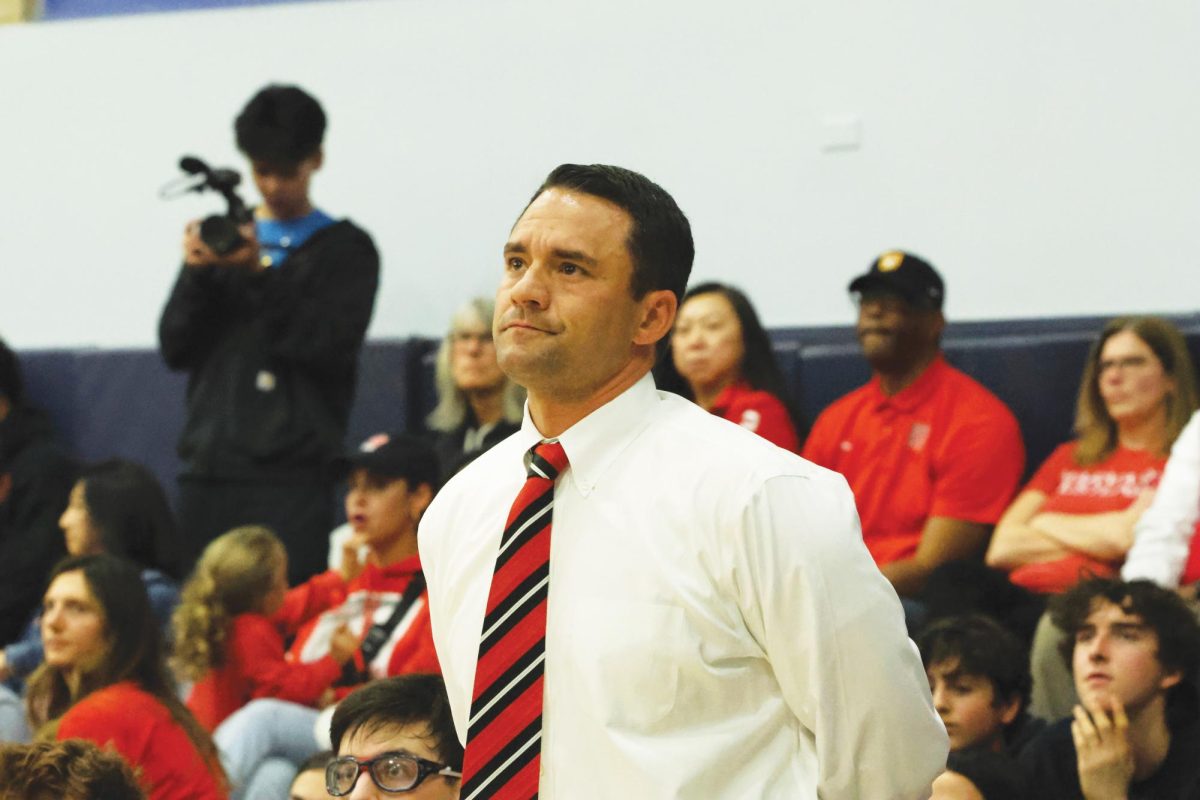Â
By Candice Navi and Michelle Nosratian
A sleek, silver bullet train tore through the Japanese countryside, carrying five seniors: Andrew Zaragoza, Aidan Brewster, Azuka Ehi, Henry Mantel and Robert Reeves. It was a few days into their journey, and the five friends were enroute to Koyasan, the place where Japanese Buddhism originated.
However, the trip, as planned at the beginning of the year, was supposed to include one more traveler: Brendan Kutler.
Kutlerâs death in December was devastating to his close friends, but Mantel and Ehi came up with an innovative way to honor their friend.
“I asked Mr. Kutler for a few bracelets, the ones that say âJust Bâ on them, to leave in Japan, and he gave me as many as I could hold,” Mantel said. “I ended up leaving five of them in Japan in different towns.”
“The day we were leaving Kinosaki we saw a festival going on and people were floating baskets down the river. Ehi had the idea to buy a basket and put a bracelet in it,” he said.
“Perhaps our best opportunity to honor Brendan came in Koyasan, where we stayed for a night in the Buddhist temple, Eko-in,” Reeves said. “There, we each chipped in to make an offering in honor of Brendan. Every day for the next year, the monks at Eko-in will write his name in a ceremonial book and pray for him.”
The boys also experienced two ancient ceremonies during their stay with the monks, the first of which honored Brendan and all those who have passed.
The group sought not only to fully experience the countryâs unique culture, but also to test their own proficiency in Japanese.
“I made sure we spent a good deal of time experiencing old Japan, which also meant dealing with people who spoke little to no English,” Reeves said. “It really stretched our Japanese abilities and was often rewarding, but it also showed us how much we still have to learn.”
The idea for the memorable trip began in Kyoko Tomikuraâs Japanese IV class.
“Being in a class with only a dozen or fewer people, all brought together by our love of video games, anime and manga, we were predisposed to become a mini-clique amongst ourselves,” Zaragoza said. “That culminated in spending two weeks together in Japan.”
Stop number one was Matsumoto, a small town north of Tokyo.
“We stayed at a nice traditional inn and saw one of the best-preserved castles in Japan,” Mantel said.
From Mastsumoto, the boys took a bus to Shirakawago,”a beautiful scenic farm town” secluded by the mountains.
“We stayed in an old style farmhouse which was quite an interesting place to stay,” Mantel said. “There was a great lookout point that gave an amazing view of the mountains and village. Many photos were taken.”
“Osaka is what you would get if you combined New York, Vegas and some kind of hallucinogenic drug because that place was insane,” Mantel said.
The group stopped in Osaka at Mantelâs special request.
A train, cable car and bus later, the boys were enjoying vegetarian meals courtesy of Buddhist monks, watching monks pray and visiting a cemetery in Koyasan.
“Of all the towns the Buddhist one was my favorite, the sense of culture, the architecture you couldnât imagine from just hearing about it, and just the feeling you get walking around the shrines and the temples, I suggest everyone go to Koyasan at least once in their life,” Zaragoza said.
The sakura, or cherry blossom trees, were in their peak season when the travelers arrived in Kyoto.
“We bought lunches and went to the park to see the sakura,” Mantel said. “There were hundreds of people there.”
The next stop was Kinosaki, a traditional town famous for its onsens, or public baths.
“Yes, you have to get naked with a bunch of guys, but after the first time the awkwardness went away and we just enjoyed the waters,” Mantel said. “Really, really hot waters. Felt great. Also in that town you can walk around in a traditional Yukatta no matter where you go. Thatâs just a robe basically.”
The boys didnât experience much of a culture shock during their trip to Japan, Zargoza said.
“If anything our cultural preconceptions made us appreciate everything all the more, like the styles of the traditional rooms or the politeness of everyone we met, especially if we were in a store or a restaurant,” Zaragoza said. “Different cities had a different mix of American culture and of course traditional Japanese culture.
Places like Tokyo gave the same feeling a city like New York would but with a Japanese spin, while places like Shirakawago felt like a 100 percent true Japanese experience.”
“On the whole, I would say that experiencing an Asian culture is something everyone should do given the chance,” Reeves said. “Many if not most Harvard-Westlake students have visited Europe at some point, but America is barely removed from its European roots. Japan is the only Asian culture Iâve experienced firsthand, but it really is unlike America and Europe in fundamental ways. Itâs thrilling to discover how different human beings can truly be.”






































